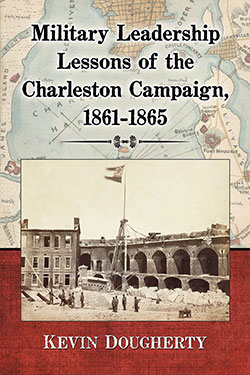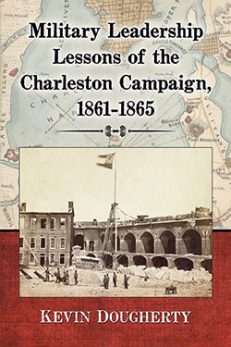Military Leadership Lessons of the Charleston Campaign, 1861–1865
$29.95
In stock
About the Book
This is an exploration of the Charleston Campaign in the Civil War through the lens of leadership. Part One, “Understanding Charleston,” contains a discussion of leadership, a campaign overview, and a brief introduction to the key participants. Part Two, “Leadership Vignettes,” includes 21 scenarios that span the actions of the most senior leaders down to those of individual soldiers. Each scenario provides the context, explains the action in the terms of leadership lessons learned, and concludes with a list of “take-aways” to crystallize the lessons for the reader.
The book ends with summary information and a set of conclusions about leadership during the Charleston Campaign. Although it featured some of the era’s most advanced military technology, the Charleston Campaign was decided by more than just shot and shell, and this book offers a perspective of the campaign as a leadership laboratory.
About the Author(s)
Bibliographic Details
Kevin Dougherty
Format: softcover (6 x 9)
Pages: 232
Bibliographic Info: notes, bibliography, index
Copyright Date: 2014
pISBN: 978-0-7864-7926-9
eISBN: 978-1-4766-1453-3
Imprint: McFarland
Table of Contents
Introduction 1
Part One: Understanding Charleston
1. Leadership During the Civil War 7
2. Charleston Campaign Overview 25
3. The Key Players 32
Part Two: Leadership Vignettes
4. James Buchanan and Ignoring Responsibility 45
5. Robert Anderson and Embracing Responsibility 52
6. Gideon Welles and Strategic Vision 65
7. Robert E. Lee and Prioritization 72
8. John Pemberton and Strategic Leadership Skills 78
9. Robert Smalls and Seizing the Moment 86
10. James Chesnut and Mentorship 90
11. Thomas Lamar and Charismatic Leadership 96
12. David Hunter and the Need for Cooperation 104
13. Gabriel Rains and Alternative Solutions 110
14. Samuel Du Pont and Synchronization with Superiors 116
15. Adolphus LaCoste and Maximizing Resources 123
16. John Dahlgren and Command Presence 129
17. Quincy Gillmore and Frame of Reference 136
18. Robert Shaw and Moral Leadership 144
19. William Carney and Personal Bravery 152
20. Clara Barton and Servant Leadership 158
21. Johnson Hagood and the Go-to Guy 164
22. Edward Serrell and Charles Sellmer and Problem-Solving 171
23. Thomas Lockwood and the Entrepreneurial Spirit 178
24. George Dixon and the Power of Persuasion 186
Part Three: Summary
25. The Fall of Charleston 195
Notes 201
Bibliography 214
Index 220
Book Reviews & Awards
“an excellent overview…inspiring…one of the best studies of Charleston to be published in many years…superb”—Civil War News.





